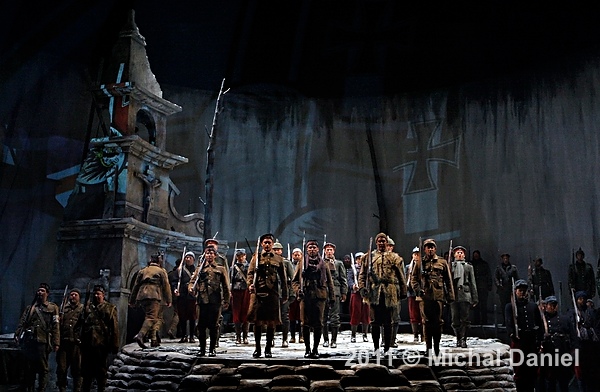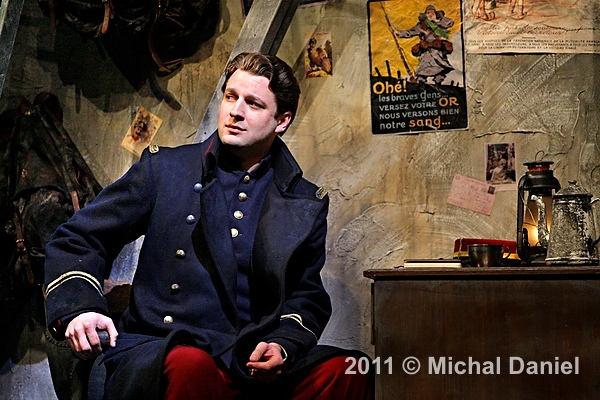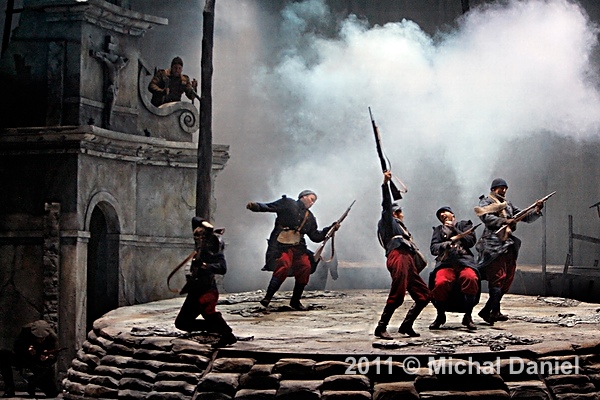
Minnesota Opera’s “Silent Night” recounts the Christmas truce of World War I
“Opera is accused of being a ‘museum’ art form, so world premieres are a big deal — there just aren’t that many of them these days,” says the American correspondent for “Opera News,” speaking at the press meet-and-greet before the final dress rehearsal of Minnesota Opera’s newly commissioned production, “Silent Night,” which opened this weekend.
Adapted from Christian Carion’s screenplay for the 2005 film, “Joyeux Noël,” the opera is based on the true story of an impromptu Christmas truce in 1914, when troops fighting along the Western Front during World War I agreed amongst themselves to cease fire in order to celebrate the holiday together and bury their dead. The story, which unfolds in the opera, centers on French, Scottish and German troops engaged in vicious combat with each other near the border of France, in the days on and around that fateful Christmas day. The set design cleverly renders all three camps, which literally revolve around a sandbagged no-man’s-land at the center, where the fighting and dying take place.
“Silent Night,” composer Kevin Puts’ first foray into composing for opera, is the latest production to come from the Knight Arts grantee company’s New Works Initiative. Based on what I heard at the Ordway last week, this opera should by no means be Puts’ last. His score is subtle, angular, disquieting; the audio-scapes in the music suit the time period of the opera’s story, evocative of the atonal, amelodic compositions that marked early 20th-century classical music — Schonberg, Stravinsky, Mahler. It’s a big, enveloping production: a chorus of 48 and a 67-piece orchestra, led by conductor Michael Christie and under the direction of Eric Simonson. Songs are sung in French, German, English, Italian and Latin (with English translations projected for the audience above the stage).
It’s an affecting work, certainly, but you should be aware that this isn’t the usual feel-good holiday show. The mood and music are beautiful but bleak — a mourning song for the senseless carnage of war, for the short-sighted, often ludicrous political machinations that bring ordinary citizens to such dire, lamentable ends. It’s an ensemble piece, punctuated by individual voices and songs, but where the emphasis is on the group, rather than on singular characters.
The text of the story, by award-winning librettist Mark Campbell, is contemplative, focused on the small-scale human tragedy of modern warfare. But for a few moments reprieve found in the soldiers’ camaraderie, what transpires on stage is grim. This is war, after all, and World War I, in particular, marked a new era in battle-making, notable for the brutal efficiency with which modern advances in artillery and weaponry allowed each side to lay waste to the other. What you see on stage in “Silent Night” strikes a somber tone reflective of that cultural shift.
I’m heartened to see such bold work commissioned and staged by the Minnesota Opera. That the company seeks out and puts its full support behind such challenging, intellectually layered new music is notable in itself. “Silent Night” is a memorable show, and it deserves wide audience support, something early reviews and attendance stats indicate it’s well on its way to receiving.
Minnesota Opera’s new production, “Silent Night,” directed by Simonson with music by composer Puts and libretto by Campbell, had its world premiere Nov. 12. The show continues Nov. 15, 17, 19 and 20 at the Ordway, 345 Washington St., St. Paul, Minn. Find additional ticket and show information on the Minnesota Opera website: www.mnopera.org/.
Recent Content
-
Artsarticle ·
-
Artsarticle ·
-
Artsarticle ·



